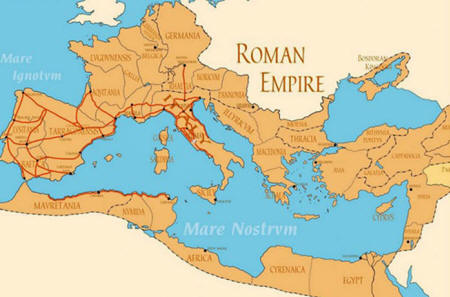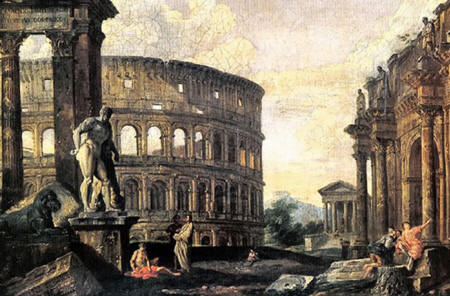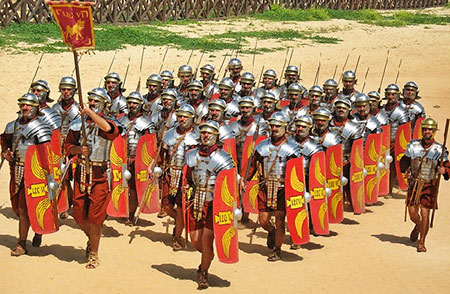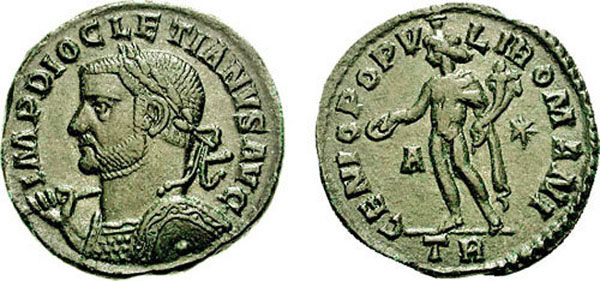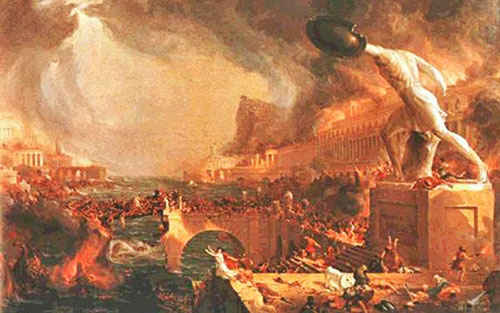|
by Doug Casey July 2016 from InternationalMan Website
Part I
I thought it might be worthwhile to discuss what happened to Rome and based on that, what's likely to happen to the U.S.
Spoiler alert:
But before continuing, please seat yourself comfortably.
This article will necessarily cover
exactly those things you're never supposed to talk about - religion
and politics - and do what you're never supposed to do, namely,
bad-mouth the military.
Everyone knows Rome declined, but few
people understand why. And, I think, even fewer realize that the
U.S. is now well along the same path for pretty much the same
reasons, which I'll explore shortly.
With Dacia, the empire peaked in size, but I'd argue it was already past its peak by almost every other measure.
But it's not just the U.S. - it's Western civilization that's in decline.
In 1910 Europe controlled almost the
whole world - politically, financially, and militarily. Now it's
becoming a Disneyland with real buildings and a petting zoo for the
Chinese. It's even further down the slippery slope than the U.S.
Like America, it was ruled by kings in
its early history. Later, Romans became self-governing, with several
Assemblies and a Senate. Later still, power devolved to the
executive, which was likely not an accident.
Publius, the pseudonymous author of The Federalist Papers, took his name from one of Rome's first consuls. As it was in Rome, military prowess is at the center of the national identity of the U.S.
When you adopt a model in earnest, you
grow to resemble it.
I'm a big fan of all three, but D&F is
not only a great history, it's very elegant and readable literature.
And it's actually a laugh riot; Gibbon had a subtle wit.
So Gibbon, like most historians, was to
a degree a collector of hearsay.
It's as though William F. Buckley, Gore Vidal, H.L. Mencken, Norman Mailer, and George Carlin all wrote about the same event, and you were left to figure out whose story was true.
That would make it tough to tell what
really happened just a few years ago… forget about ancient history.
That's why the study of history is so tendentious; so much of it is
"he said/she said."
There were many positive aspects to Rome - as there are to most civilizations. But there was much else to Rome of which I disapprove, such as its anti-commercialism, its militarism and, post-Caesar, its centralized and increasingly totalitarian government.
In that light, it's worth considering
whether the collapse of the U.S. might not be a good thing.
In 1985, a German named Demandt
assembled 210 reasons. I find some of them silly - like racial
degeneration, homosexuality, and excessive freedom. Most are
redundant. Some are just common sense - like bankruptcy, loss of
moral fiber, and corruption.
I think Gibbon was essentially right about both.
Because of the sensibilities of his era, however, he probed at early Christianity (i.e., from its founding to the mid-4th century) very gently; I've decided to deal with it less delicately.
Hopefully neither my analysis of
religion nor of barbarian invasions (then and now) will disturb too
many readers.
... all of which I'll touch on.
And, as a bonus, toward the end of this
article, I'll give you another, completely unrelated, and extremely
important reason for the collapse of both Rome and the U.S.
It looks a lot like the American experience over the last couple of hundred years:
There were many falls.
Maybe we should use 1453, when Constantinople and the Eastern Empire fell.
Maybe the Empire is still alive today in
the form of
the Catholic Church - the Pope is
the Pontifex Maximus wearing red slippers, as did
Julius Caesar when he held that position.
I think we can argue America entered its Principate with the accession of Roosevelt in 1933; since then, the president has reigned supreme over the Congress, as Augustus did over the Senate.
Pretenses fell off increasingly over
time in Rome, just as they have in the U.S.
This happened with the ascension of Diocletian in 284 and then, after another civil war, Constantine in 306. From that point forward, the emperor no longer even pretended to be the first among equals and was treated as an oriental potentate.
The same trend is in motion in the U.S, but we're still a ways from reaching its endpoint - although it has to be noted that the president is now protected by hundreds, even thousands, of bodyguards.
Harry Truman was the last president who
actually dared to go out and informally stroll about DC, like a
common citizen, while in office.
And today in the U.S., that's probably true of its praetorians:
We'll see how the next hanging-chad
presidential election dispute gets settled.
You have to remember that war has always been the health of the state. The Roman emperors were expected, not least by their soldiers, to always be engaged in war. And it's no accident that the so-called greatest U.S. presidents were war presidents - Lincoln, Wilson, and FDR.
We can humorously add the self-proclaimed war president Baby Bush.
Military heroes - like Washington, Andrew Jackson, Ulysses Grant, Teddy Roosevelt, and Eisenhower - are always easy to elect.
My guess is that a general will run for office in the next election, when we'll be in a genuine crisis. The public will want a general partly because the military is now by far the most trusted institution of U.S. society.
His likely election will be a mistake
for numerous reasons, not least that the military is really just a
heavily armed variant of the postal service.
One additional political parallel with the U.S.:
The U.S. now has its first
Kenyan president - just kidding, of course...
July 22, 2016
In Rome, the law started with the 12
Tablets in 451 BCE, with few dictates and simple enough to be
inscribed on bronze for all to see. A separate body of common law
developed from trials, held sometimes in the Forum, sometimes in the
Senate.
But as the government and its
legislation became more ponderous, the saying became increasingly
ridiculous. Eventually, under Diocletian, law became
completely arbitrary, with everything done by the emperor's decrees
- we call them
Executive Orders today.
As in the U.S., in Rome statute and
common law gradually devolved into a maze of bureaucratic rules.
The old Roman religion never tried to
capture men's minds this way. Before Christianity, violating the
emperor's laws wasn't seen as also violating God's laws.
Now you can read Harvey Silverglate's
book,
Three Felonies a Day, which
argues that the average modern-day American, mostly unwittingly, is
running his own personal crime wave - because federal law has
criminalized over 5,000 different acts.
Tacitus (56-117 AD) understood why:
The Roman government began offering useless mouths free bread, and later circuses, in the late Republic, after the three Punic Wars (264-146 BCE). Bread and circuses were mostly limited to the capital itself.
They were extremely destructive, of
course, but were provided strictly for a practical reason: to keep
the mob under control.
Programs like,
...and numerous other welfare programs absorb over 50% of the U.S. budget, and they're going to grow rapidly for a while longer, although I predict they'll come to an end or be radically reformed within the next 20 years.
I recognize that's a daring prediction, given the longevity of the dole in Rome.
Ancient plagues are poorly documented, perhaps because they were viewed as normal happenings. But there may be other, subtler reasons for the drop in population.
Perhaps people weren't just dying, they also weren't reproducing, which is much more serious.
The rising Christian religion was puritanical and encouraged celibacy. Especially among the Gnostic strains of early Christianity, celibacy was part of the formula for perfection and knowledge of God.
But of course, if Christianity had been effective in encouraging celibacy, it would have died out. The same thing is now happening throughout the developed world - especially in Europe and Japan, but also in the U.S. and China.
After WW II, American women averaged 3.7 children. Now it's 1.8; in parts of Europe, it's 1.3. Part of that is due to urbanization and part to an understanding of birth control, but a growing part is that they just can't afford it; it's very expensive to have a kid today.
And I believe another major element is a new religious movement, Greenism, which is analogous to early Christianity in many ways. It's now considered antisocial to reproduce, since having kids raises your carbon footprint.
This is true of not just religions in general, but the desert religions of Judaism, Christianity, and Islam in particular - each more extreme than its predecessor. In late antiquity, there was a battle between the faith of the Fathers of the Church and the reason of the philosophers.
Christianity halted the progress of reason, which had been growing in the Greco-Roman world since the days of the Ionian rationalists,
...and others, right up to,
Knowledge of how the world worked was
compounding, albeit slowly - then came to a stop with the triumph of
superstition in the 4th century. And went into
reverse during the Dark Ages, starting in the 6th century.
The church drew generations of men away from intellectual and scientific pursuits and toward otherworldly pursuits - which didn't help the Roman cause. It can be argued that, if not for Christianity, the ancient world might have made a leap to an industrial revolution.
It's impossible to make scientific
progress if the reigning meme holds that if it's not the word of a
god, it's not worth knowing.
Aquinas was lucky he wasn't condemned as a heretic instead of being turned into a saint.
His thought had some unintended
consequences, however, which led to the Renaissance, the Industrial
Revolution, and today's world. At least until Aquinas, Christianity
slowed the ascent of man and the rise of rationalism and science by
centuries, in addition to its complicity in the fall of Rome.
Over the last 100, even the last 50 years, Christianity has fallen to the status of a back story for Santa Claus and quaint, albeit poetic, folk wisdom tales...
August 05, 2016
Wars made Rome.
Wars expanded the country's borders and
brought it wealth, but they also sowed the seeds of its destruction,
especially the three big wars against Carthage, 264-146 BCE.
You had to be a landowner to join the Roman army; it was a great honor, and it wouldn't take the riffraff. When the Republic was threatened - and wars were constant and uninterrupted from the beginning - a legionary might be gone for five, ten, or more years.
His wife and children back on the farm might have to borrow money to keep things going and then perhaps default, so soldiers' farms would go back to bush or get taken over by creditors. And, if he survived the wars, an ex-legionary might be hard to keep down on the farm after years of looting, plundering, and enslaving the enemy.
On top of that, tidal waves of slaves
became available to work freshly confiscated properties. So, like
America, Rome became more urban and less agrarian. Like America,
there were fewer family farmers but more industrial-scale latifundia.
The interesting thing is that in the early days, war was actually quite profitable.
You conquered a place and stole all the gold, cattle, and other movable property and enslaved the people. That was a lot of wealth you could bring home - and then you could milk the area for many years with taxes.
But the wars helped destroy Rome's social fabric by wiping out the country's agrarian, republican roots and by corrupting everyone with a constant influx of cheap slave labor and free imported food.
War created longer, faraway borders that
then needed to be defended. And in the end, hostile contact with
"barbarians" actually wound up drawing them in as invaders.
I always look at the bright side,
however: after every foreign misadventure, the U.S. gets an influx
of new restaurants with exotic cuisines.
At this point, there was nothing new to steal, but there were continuing costs of administration and border defense.
It was inconvenient - and not perhaps just coincidental - that the barbarians started becoming really problematic just about when Christianity started becoming popular, in the 3rd century.
Unlike today, in its early days
Christianity encouraged pacifism… not the best thing when you're
faced with barbarian invasions.
This is pretty much how the U.S. armed forces have evolved.
For all the "Support Our Troops"
propaganda, the U.S. armed forces are now more representative of the
barrios, ghettos, and trailer parks than of the country as a whole.
And they're isolated from it, a class unto themselves, like the late
Roman army.
After its rout at the Battle of
Adrianople in 378, the Western empire went into a death spiral. The
U.S. armed forces may now be in an analogous posture, comparable to
Soviet forces in the 1980s.
Most U.S. equipment is good only for fighting a replay of WW II - things like the $2 billion B-2 bomber, the $350 million F-22, and the $110 million V-22 Osprey are high-priced dinosaurs.
The Army lost 5,000 helicopters in Vietnam. How many Blackhawks can the U.S. afford to lose in the next war at $25 million each?
World War II cost the U.S. $288 billion,
in 1940 dollars. The
pointless adventures in Iraq and Afghanistan
are guesstimated at $4 trillion, a roughly comparable amount in real
terms.
We won't really know who they are, but they'll be very effective at attacking hugely expensive infrastructure at near-zero cost, by hacking computers. They won't need a B-2 when a stolen Pakistani nuke can be delivered by freighter. They can take out a $5 million M-1 tank with an essentially zero-cost improvised incendiary device.
While the U.S. bankrupts itself
with defense contractors whose weapons have 20-year development
times, enemies will use open-source warfare, entrepreneurially
developing low-cost, unconventional weapons with off-the-shelf
components.
Let me relate an anecdote offered by
Priscus, a Roman ambassador to the court of Atilla in about 450
AD. While there he met a Greek who had joined the barbarians. This
will give you a flavor of the story he tells Priscus.
The Romans, on the other hand, are very liable to perish in war, as they have to rest their hopes of safety on others, and are not allowed, on account of their tyrants, to use arms. And those who use them are injured by the cowardice of their generals, who cannot support the conduct of war.
But the condition of the subjects in
time of peace is far more grievous than the evils of war, for the
exaction of the taxes is very severe, and unprincipled men inflict
injuries on others, because the laws are practically not valid
against all classes.
It's true that the U.S. will bankrupt
itself by fighting the ridiculous and chimerical "War
on Terror," maintaining hundreds of military bases and
operations around the world and perhaps getting into a major war.
But from a cultural point of view, it's possible that the southern
border will present an equally serious problem.
The problem now isn't invading hordes, but a population that has no cultural allegiance to the idea of America.
A surprising number of the Mexicans who
cross over to the U.S. talk seriously about a Reconquista, in
reference to the fact the Americans stole the land in question from
people they presume to be their ancestors.
Most are "illegal," as you might say the Goths, the Vandals, and the Huns were in Rome's final days.
My guess is that in the near future, there will be a lot of young Hispanic males who actively resent paying half of what they make in income, Social Security, and Obamacare taxes in order to subsidize old white women in the Northeast.
I wouldn't be surprised to see parts of
the Southwest turn into "no go" zones for many government agencies
over the next several decades.
Despite the presence of Walmarts, McDonald's, and Chevrolet dealerships across a country whose roads are as impressive as the nearly 50,000 miles of highway laid down by the Romans, there's evidence the country is disintegrating culturally.
Although what is occurring in the Mexican borderland area is the most significant thing, there are growing cultural and political differences between the so-called "red" and "blue" states.
Semi-serious secession movements are at work in northern Colorado, western Maryland, and western Kansas.
This is a new phenomenon, at least since the War Between the States of 1861-65...
August 12, 2016
Soil exhaustion, deforestation, and pollution - which abetted plagues - were problems for Rome.
As was lead poisoning, in that the metal was widely used for eating and drinking utensils and for cookware. None of these things could bring down the house, but neither did they improve the situation.
They might be equated today with,
Is the U.S. agricultural base unstable because it relies on gigantic monocultures of bioengineered grains that in turn rely on heavy inputs of chemicals, pesticides, and mined fertilizers?
It's true that production per acre has
gone up steeply because of these things, but that's despite the
general decrease in depth of topsoil, destruction of native worms
and bacteria, and growing pesticide resistance of weeds.
But these things have all been necessary
to maintain the U.S. balance of trade, keep food prices down, and
feed the expanding world population. It may turn out, however, to
have been a bad trade-off.
Which also correlates with the invasions by northern barbarians.
It's certainly a factor greatly underrated by historians generally, who usually have no understanding of economics at all. Inflation, taxation, and regulation made production increasingly difficult as the empire grew, just as in the U.S.
Romans wanted to leave the country, much
as many Americans do today.
Next is Salvian, circa 440 AC:
One of the most disturbing things about this statement is that it shows the tax collectors were most rapacious at a time when the Empire had almost ceased to exist.
My belief is that economic factors were
paramount in the decline of Rome, just as they are with the U.S. The
state made production harder and more expensive, it limited economic
mobility, and the state-engineered inflation made saving pointless.
The similarities between the inflation in Rome versus the U.S. are striking and well known.
In the U.S., the currency was basically quite stable from the country's founding until 1913, with the creation of the Federal Reserve. Since then, the currency has lost over 95% of its value, and the trend is accelerating.
In the case of Rome, the denarius was
stable until
the Principate. Thereafter it lost
value at an accelerating rate until reaching essentially zero by the
middle of the 3rd century, coincidental with the
Empire's near collapse.
All earlier coins were graced with a
representation of an honored concept, a god, an athletic image, or
the like. After Caesar, a coin's obverse always showed the head of
the emperor.
The first coin with the image of a president was,
The deification of political figures is
a disturbing trend the Romans would have recognized.
With its attitude of waiting for
heaven and belief that this world is just a test, it
encouraged Romans to hold material things in low regard and
essentially despise money.
But it's being replaced by new secular religions that do...
Yes, we have an analogue of early Christianity chewing away at our civilization's foundations. And yes, we have a virtual barbarian invasion to contend with.
But there's another factor, I think, that worked against the Romans and is working against us… one Gibbon didn't consider.
The Romans reached their physical limits within the confines of their scientific, engineering, economic, and other areas of knowledge.
And the moral values of their civilization, their founding philosophies, were washed away by a new religion.
We may reach our technological limits.
And our founding values are certainly being washed away.
That statement has been true for at least the last 200 years - and it's been a gigantic advantage we've had over the Romans. But it may stop being true in the next few generations as the population levels off and then declines, as is happening in Japan, Europe, China, and most of the developed world.
It's compounded by the fact that U.S. universities aren't graduating Ph.D.s in engineering, mathematics, and physics so much as in gender studies, sociology, English, and J.D.s in law.
As it degrades, the U.S. will not only
draw in fewer enterprising foreigners, it will export its more
competent natives.
Unfortunately, although a few might
agree with that, it's not going to happen. Not even if most people
agree.
And many tens of millions more in their families and throughout the private sector that depend on them. And many tens of millions more that rely directly on the state for Social Security, Medicare, Medicaid, and other direct payments. And millions more associated with quasi-state institutions like NGOs, think tanks, law firms, lobbying groups, and the like.
The parasitic mechanism of the state has
become key to their survival. Even if many in their ranks see the
dysfunction now planted in America, they're hardly going to break
their own well-filled rice bowls.
So you're not going to see any dysfunctional organization dissolve itself. It'll keep trying to grow until it self-destructs or an outside force destroys it.
Beyond a certain stage, any serious
reform is impossible. In the case of the U.S., it's now host to a
completely inoperable cancer, as the government and its satellites
grow faster than ever, while the productive economy contracts.
Rome ran up against imperial overstretch. So did Alexander, Napoleon, and Hitler.
The Spanish, French, British, and Soviet empires all did as well. It's a natural thing with all living organisms, to try to grow until they can't grow any further, until their energy expenditures exceed their inputs, and/or they're too large and complex to be controllable, at which point they either rot from within or fall to external predators.
It's as though the Peter Principle applies to all of nature:
But does it really matter if the U.S. declines?
It's already morphed from America -
which we all loved - into something else. And it's morphing even
more in the wrong direction, at an accelerating rate, as did Rome.
The U.S. is declining in all the areas I've touched on. But it's not
unique; it's following the course of all states and all things.
But in large, complex, politically based systems, it's not only commonplace, it's salubrious, because it allows workarounds. Corruption becomes like an oxygen tank to an emphysema victim - awkward but needed.
Rulers, however, never attempt to cure the underlying disease by simplifying the complex systems they've built. Instead they pass more laws, making the system ever more like a Rube Goldberg machine, with even more complexities and inefficiencies.
That's always counterproductive, since compounded complexity makes the eventual collapse even worse.
And harder to recover from. And more
nearly inevitable.
Conclusion
There are several possibilities to consider, based on what we know about Rome.
Don't be too stressed by mega events.
Life isn't just full of problems: it is problems.
We're looking at a giant crisis, but a crisis is a combination of both danger and opportunity. Look at the bright side while you try to dodge the negative effects.
See it as,
I hope seeing America reflected in the distant mirror of Ancient Rome helps to put things in perspective...
|


